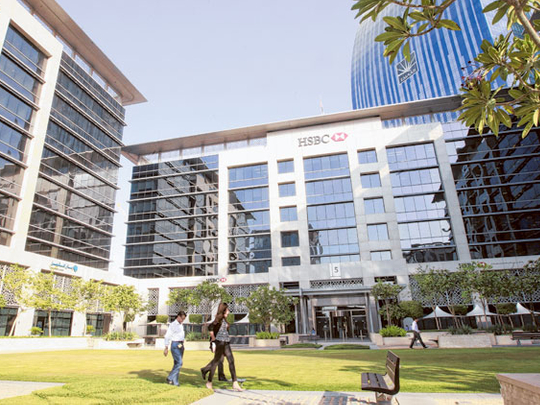
Dubai: HSBC’s UAE operations, its most profitable in the region, =reported $383 million pre-tax profit for the first six months of 2014, up 13.64 per cent compared to $337 million for the same period in 2013.
While Global Banking and Markets contributed $203 million, Commercial banking and the Retail Banking and Wealth Management business contributed $133 million and $82 million respectively to the bank’s UAE profit.
The bank’s Middle East and North Africa (Mena) operations reported a profit before tax of $1 billion, an increase of 9 per cent compared to the first half of last year.
HSBC’s first-half global earnings fell 12 per cent, missing analyst estimates, as investment banking profit declined. Pre-tax profit dropped to $12.3 billion from $14.1 billion in the year-earlier period, the bank said.
“Whilst regulatory uncertainty persists, our balance sheet remains strong and our continuing ability to generate capital supports both growth and our progressive dividend policy,” Chief Executive Officer Stuart Gulliver said in a statement.
Investment banking unit profit dropped 12 per cent to $5.03 billion. “Global Banking and Markets, with its differentiated business model, was affected by low market volatility and client activity in our Markets business; however, we increased our market share in debt and equity capital markets, mergers and acquisitions, and lending,” Gulliver said.
In the Mena region, while the UAE contributed the biggest share in profits in the first half of the year, Saudi Arabia, Egypt and Qatar contributed $259 million, $149 million and $66 million, respectively.
“Our Middle East business continues to perform well, albeit overshadowed by regional uncertainties,” said Gulliver.
Banks active in the Middle East have been benefiting from strong economic growth in the energy-rich Gulf region where high oil prices spur massive government investments in large projects.
Net interest income for the region was broadly unchanged. In the UAE, the increase is attributed to improved earning from retail banking and wealth management business (RBWM) due to an increase in residential mortgage balances, reflected growth in the property market and improved deposit spreads as a result of re-pricing initiatives, the bank said in its Interim Management Report.
Net fee income for the region increased by 8 per cent in the first half of the year, primarily in the UAE. In GB&M, net fee income was higher, driven by increased flows in our Equities business which in part reflected the upgrade of the UAE to ‘Emerging Markets’ status in the MSCI index. In addition, there was an increase in advisory mandates in Project and Export Finance in Capital Financing.
In the first half of the year net loan impairment for the region was higher by $3 million, primarily in the UAE driven by net releases of individually assessed allowances in GB&M. However, this was offset in part by lower impairment releases for a small number of UAE-related exposures.
The bank’s operating expenses were broadly unchanged. In Egypt, expenses decreased due to the non-recurrence of charges relating to changes in the interpretation of tax regulations. This was partly offset by increased expenses in the UAE, driven by wage inflation, investment in the Risk and Compliance functions, higher customer facing staff in RBWM and increased service and product support staff in CMB.
Share of profits from associates and joint ventures in the region increased by 15 per cent, mainly from The Saudi British Bank. This was driven by higher revenue resulting from strong balance sheet growth, and the management of costs and risks.










